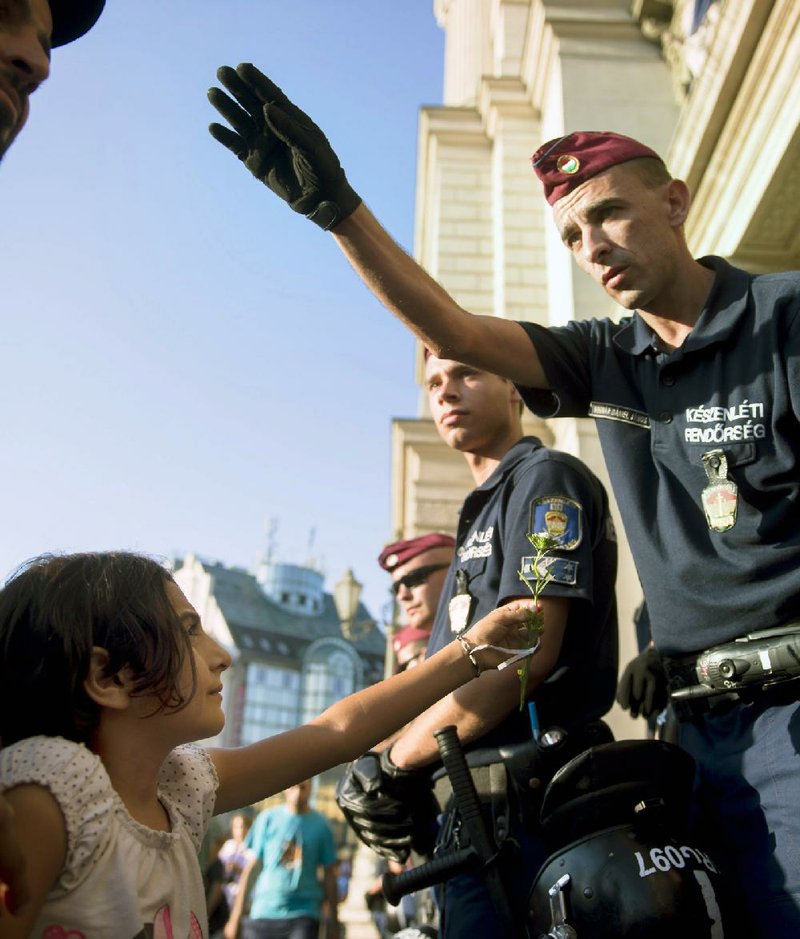BUDAPEST, Hungary -- Migrants on Tuesday demanded to be let aboard trains bound for Austria and Germany after Hungary temporarily suspended all rail traffic from its main Budapest terminal.
Police forced hundreds of migrants out of the city's Keleti train station. Scores of people protested for hours, waving newly purchased train tickets in the air.
Scuffles broke out Tuesday morning at Keleti station as hundreds of migrants pushed toward the metal gates where a train was scheduled to leave for Vienna and Munich, only to be blocked by police.
Authorities announced over loudspeakers that all trains would be stopped indefinitely from leaving. Migrants' papers were checked, and those with train tickets but no EU visas were ushered out of the station.
Outside, hundreds who had bought tickets chanted "Germany" and "U.N." Hungary's national rail company, Mav, said it no longer would sell train tickets to customers who could not present proper identification and, where required, visas. It said customers would be allowed to buy tickets only for themselves.
Mohammed, a 24-year-old economist from the Syrian city of Aleppo, said the situation outside the station was the worst he had seen since leaving Syria. He refused to reveal his last name, citing security concerns about his family still in Aleppo.
Mohammed said he had bought a ticket to Munich for $225 after Hungarian police told him Monday night that migrants would be allowed to leave. Despite showing a valid Syrian passport Tuesday to police guarding the train platform, he was told he could not get on board because he did not have a visa for Germany.
Hours later, train service was restored for passengers with valid travel documents.
Janos Lazar, chief of staff to Prime Minister Viktor Orban, told lawmakers that Hungary disagreed with Germany's openness to taking refugees from war-torn Syria. He blamed Germany and what he called other "left-wing governments" in Europe for encouraging the rush of migrants.
"The defense of our borders is important, not opening the borders," he said.
German Chancellor Angela Merkel rejected Hungary's criticism of Germany's asylum policy, saying her country was offering the same welcome to people fleeing war in Syria that all members of the 28-nation EU, including Hungary, should provide.
Speaking in Berlin, Merkel said Germany shouldn't be expected to accept most of the Syrian refugees, and she asked that EU partners volunteer to take more. Germany expects to take in 800,000 asylum-seekers this year, compared with fewer than 3,000 for Spain.
Merkel said Germany typically gives refugee protection to Syrian citizens fleeing the country's 4-year-old war. "That should come as no surprise. Actually, it should be the same in every European country," she said.
Hundreds of refugees, many fleeing the Syrian war, arrived in Germany late Monday and early Tuesday from Hungary and Austria.
More than 500 people reached Munich from Vienna, and another 1,000 were expected to arrive late Tuesday in the Bavarian capital, said Ines Schantz, a government spokesman.
"We're closely monitoring the situation and are taking some special measures," she said. "We're in close contact with the city of Munich and aid organizations." Steps include handing out food to the arrivals and providing medical assistance.
European nations say more than 332,000 migrants have arrived this year. The front-line border nations of Greece, Italy and Hungary and non-EU members Serbia and Macedonia have been overwhelmed by the thousands surging across the borders.
More than 2,600 people have drowned this year as they cross the Mediterranean in smugglers' often-unseaworthy boats.
The tensions at the train station were matched by highway delays as Austrian authorities reimposed border controls at main crossings from Hungary. Vehicles at the Hegyeshalom crossing on the main highway from Budapest to Vienna faced 4-mile traffic jams at one point Tuesday because of the Austrian inspections.
The inspections were ordered after Austrian police last week found 71 people dead in a smuggler's abandoned truck, the apparent victims of suffocation.
Authorities in Germany indicated Tuesday that two suspects held in Hungary in connection with those deaths had been known to them in earlier crimes, including the smuggling of migrants to Bavaria about a month ago.
A Bulgarian man, referred to in the German media as Metodi G., is thought to be one of two people who fled a truck on a highway in Bavaria on July 25 after being chased by the police.
Police later found 38 people, mostly Afghans, crammed into the truck. But they failed to catch the two men, said Peter Wiesenberger, a public prosecutor in the Bavarian district of Deggendorf, which is near the border with Austria.
The German website Spiegel Online reported that the Afghan suspect had previously been known to the authorities in Bremen, in northwest Germany.
Information for this article was contributed by Pablo Gorondi, Shawn Pogatchnik, George Jahn, Elena Becatoros and Jamie Keaten of The Associated Press; by Alison Smale of The New York Times; and by Elisabeth Behrmann, Zoltan Simon, Alexander Weber, Jonathan Tirone and Boris Groendahl of Bloomberg News.
A Section on 09/02/2015


